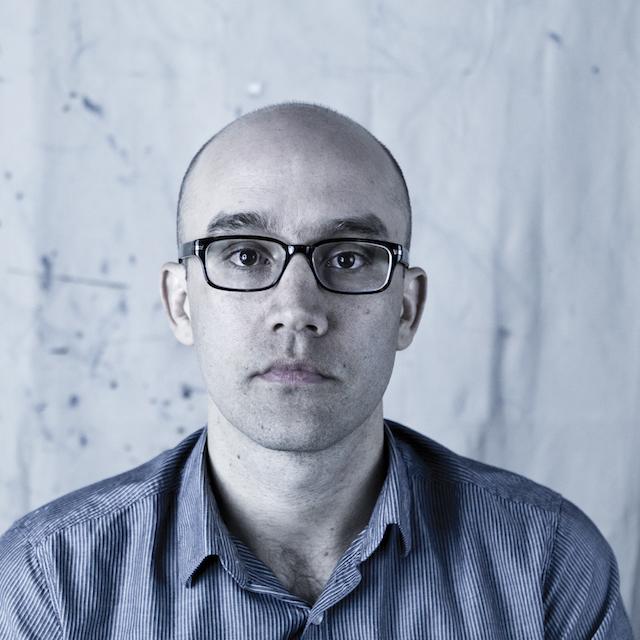It's All About the Books with NEA Literature Translation Fellow Matt Reeck

Matt Reeck received a National Endowment for the Arts Literature Translation Fellowship in 2013. A widely published poet, he is also one of the editors of the literary magazine Staging Ground and has received fellowships from the Fulbright Foundation, the American Institute of Indian Studies, and the PEN Foundation. His Arts Endowment fellowship helped to support his translation from Urdu of The House by Indian writer Paigham Afaqui. Reeck has said that literature in translation "asks us to embark on a constant path of learning, curiosity, and—dare I say it—humility." Here are his answers to our All About the Books questionnaire, including his desert island author, what's on his "To Read" list, and what you might find in the window if he owned a bookstore. (Click on the link to visit Reeck's Literature Fellowships page, which includes his author statement and an excerpt from his translaiton of The House.)
NEA: If you had to introduce yourself by way of a book, which book would you choose?
MATTHEW REECK: Too hard! Let’s say Das Kapital.
NEA: What book turned you into a committed reader?
REECK: I’ve always been a reader, for as long as I can remember. But I think earliest habits are those that survive longest. So it was probably evening story sessions as a child, usually with my mother reading to my sister and me. I remember loving The Secret Garden, and I still dream of having a secret space like that—maybe that’s what books are for me.
NEA: What book made you want to become a poet? What book made you want to become a literary translator?
REECK: I grew up in Manhattan, Kansas, so the poetry shelves of the local bookstores weren’t too big. Maybe the first poetry book I would have got my hands on outside of a classroom was something by Kansas poet William Stafford. I’ve always liked being outside, so Stafford was someone who encouraged me to stay outside and observe things.
As for a literary translator, it was Manto. When you read Manto for the first time in Urdu, your life changes, and you take on ideas probably best left aside—like being a literary translator.
NEA: Which books are sitting in your “To Read” pile at the moment?
REECK: Emmanuel Dongala’s Johnny chien méchant, Nathanaël’s translation of Edouard Glissant’s Soleil de la conscience, Shumona Sinha’s Calcutta, Jason Grunbaum and Ulrike Stark’s translation of Mahzoor Ahtesham’s Dastan-e-lapata, Julien Columeau’s Chorangi and Zahid aur do kahaniyan, Stève Puig’s Littérature urbaine et mémoire postcoloniale, Anselm Berrigan’s Something for Everyone, Jill Magi’s Speech, everything by Shrilal Shukla, Mladen Dolar’s A Voice and Nothing More.
NEA: How do you decide what to read?
REECK: I usually feel I need to catch up on something I should already be reading, have read, or know more about. I also usually avoid what everyone else is reading—a bad habit, probably, but one I’ve always had. It took me traveling in India alone for five months when I was twenty to catch up on all the classics I had assiduously avoided in college—The Iliad, The Odyssey, The Aeneid, the Greek classical dramas, and all of Victorian English literature bought at bookstores across North India.
NEA: Which books would you say taught you how to write? Which books taught you how to be good translator?
REECK: Maybe Hemingway? I remember trying to write like him. His concision taught me to understand the power of simple language, and then, by contrast, the joys of everything else. In poetry, I’m fascinated by poets who achieve a sense of the vital nature of few words, like in Myung Mi Kim, Susan Howe, and Lisa Jarnot.
In terms of translating, I’d probably just say the joy of translating is that every book teaches you something different, makes you adjust your method, if just a little bit.
NEA: If you could give one book in translation to everyone you know, what would it be?
REECK: Das Kapital?
NEA: What book(s) do you find yourself regularly rereading?
Unfortunately, the only books I reread are those I’m quoting from—otherwise, Laure Murat interviewed French writers about the phenomenon (practiced by some) of rereading. I heard her present on it in Paris, Relire.
NEA: If you had to give up all your books except for ones by a particular author, which author would you choose?
REECK: Probably Karl Marx!
NEA: If you owned a bookstore, what five books would be in your display window right now?
REECK: It would be a used bookstore, for sure. So that would probably be contingent upon what people bring in. I dislike bookstores that are over-curated, where the bookseller’s taste seems more the point than anything else. I like used bookstores where the bookseller is just as surprised as the book buyer about the books that come to the counter. All my good book buying memories are like this. But schematically there’d have to be an out-of-print poetry book, a book in a foreign language, a Korean cookbook, a history of science book, and a kid’s book. But I’d also put in my favorite bookstore find of all time, a book of Hindi baby names, bought in the basement bookstore of Hindi Book Center on Asaf Ali Marg in Delhi.




